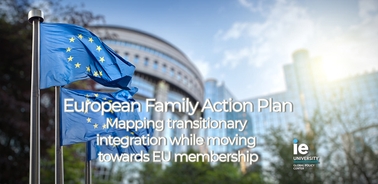The European Family Action Plan: increasing cooperation and coordination during EU enlargement

The IE GPC presents its first Policy Brief “European Family Action Plan. Mapping transitionary integration while moving towards EU membership“.
In line with its aim to shape future trends in global politics and economics, IE Global Policy Center (GPC) presents its first Policy Brief, exploring shifting global dynamics and their impact on EU enlargement policy.
The Brief, entitled “European Family Action Plan. Mapping transitionary integration while moving towards EU membership” is co-authored by the Center’s director, Ilke Toygür, and Nicolai von Ondorza, head of the EU/Europe research division at SWP Berlin.
The GPC is deeply committed to participating in the future of Europe debate, which includes the enlargement process. This Policy Brief suggests a new, more plausible form of integration: the European Family Action Plan.
We propose the idea of “transitionary integration,” an approach that aims to improve cooperation and coordination between candidate countries and the EU during the accession process. We also suggest six principles that will better prepare candidate countries for EU membership while maximizing their collaboration with the European Union.
The ongoing full-scale invasion of Ukraine by Russia reopened the discussion of how to transform and stabilize the EU’s neighborhood. When Ukraine requested EU membership in February of 2022, the general response was one of approval and acceptance.
Nonetheless, Ukraine’s EU application—followed by those of Georgia and Moldova—created a new dynamic around EU enlargement.
The EU has made progress regarding Ukraine’s application by taking publicly visible and symbolic actions aimed at moving this enlargement process forward. However, further steps are needed to create a renewed, more credible path towards EU membership.
The European Family Action Plan outlines six principles, centered around transitionary integration. The Plan aims to create increased benefits for candidate countries and improve cooperation between them and the EU during the accession process.
These principles include setting a clear path for the future, keeping conditionality at the forefront of the process, creating a palpable offer to join common instruments of the EU, and giving candidate countries access to relevant EU programs.
They also include granting a form of institutional participation in the EU during the accession process, and designing a security component in light of the evolving European Security Order.
The European Family Action Plan aims to give candidate countries time to sufficiently prepare for EU membership while granting the EU time to make the necessary adjustments for ensuring enlargement success.
Additionally, the transitionary integration approach is designed to provide political support and security guarantees alongside a necessarily bureaucratic accession process.
Transitionary integration serves neither as an alternative nor as a fast track to EU accession. Rather, this approach provides tangible benefits to both candidate countries and the European Union throughout enlargement.
By including candidate countries in policies, programs, agencies and funding, the European Family Action Plan proposes a path to improve the enlargement process in the years to come.
Most importantly, by inviting them to partake in shaping the EU beyond already existing Association Agreements, we can improve the integration process and set candidate countries up for future success.
#EUEnlargement #FutureofEurope #EuropeanFamilyActionPlan #TransitionaryIntegration #GlobalPolicyCenter #GPC